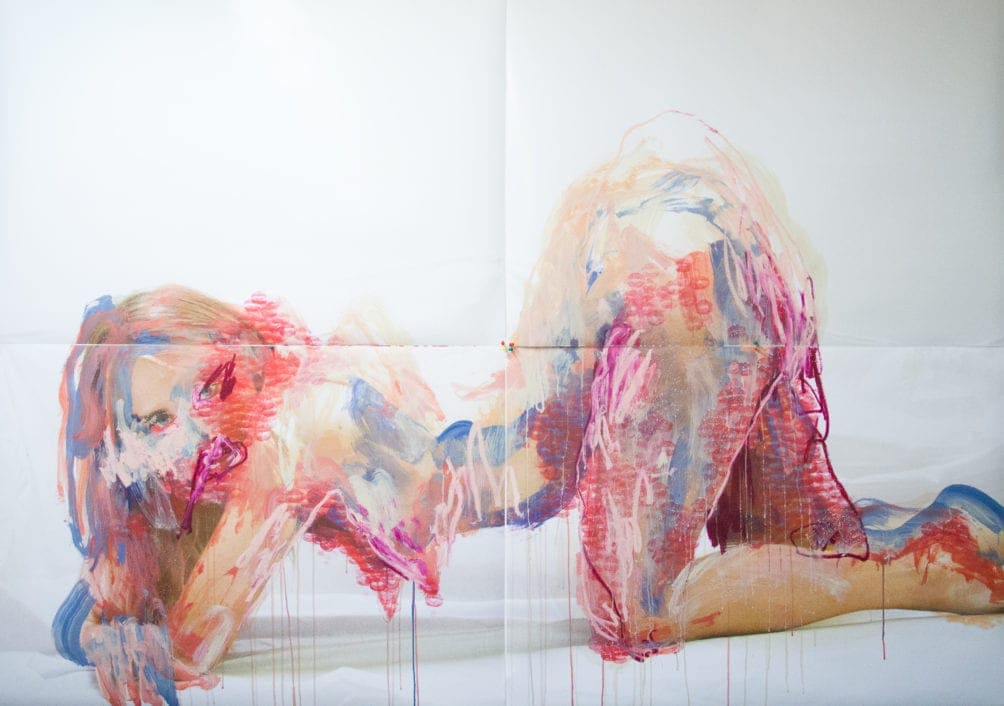
Crimson and mauve paint streaked across the white walls, a pink polaroid camera, hanging plants, art books and fashion magazines stacked high. Jess Cochrane’s Peckham studio is unapologetically gentle and inviting, much like the artist herself.
Hailing from Canberra, a sleepy Australian city that produces a disproportionate amount of creatives, Cochrane recently settled in South London after stints in Wollongong and Sydney—and she’s already making waves in the London contemporary scene.
Jess Cochrane’s Peckham studio is unapologetically gentle and inviting, much like the artist herself
Her practice involves applying flowing licks of paint to photographs of her muses which simultaneously disguise and distort the subject. Commentary on perceptions of beauty and physical flaws strike you on first glance. When I visit, the walls in her studio are adorned with enlarged magazine covers from the 90s; rings of paint contort the model’s smiles and fluid pastel-hued lines mimic sagging features over their traditionally perfect physiques.
“Art teaches you to question what you’re seeing. It’s just ingrained behaviour for me to question things or to look at the derivative of the thing that’s in front of me and ask, “Why is this image of this woman like this? Why does she look like that? Where does this come from?”
Rings of paint contort the model’s smiles and fluid pastel-hued lines mimic sagging features
“It’s all about accountability. I’m just a curious person, so I sit in my studio and ask myself questions and paint and I eventually come to some sort of resolution. But we’ll never have the answer, because if we had the answer art wouldn’t exist. Art is conversation, it’s questioning things relevant to the time and that’s what I’m trying to do.”
What fascinates me about Cochrane’s work is its interrogation of advertising, consumerism, pop culture, femininity and perfection and how these interact with a sense of community and empowerment in the age of Instagram. She’s garnered an engaged online following over the years and quickly formed a strong community of women through her art. It’s paradoxical, in a way, that her work and the community around it thrives on the very platform that so often commands the standards of beauty challenged in her work.
Despite the obvious role that photo-sharing platforms play in dictating notions of beauty, her view of social media is nuanced. She suggests that it’s not the platform itself that feeds our unhealthy perceptions, instead we must confront ourselves with the fact that the real danger is how we interact with it.
“I think what it really comes down to is this conversation around honesty. It’s quite easy to be dishonest with visual images, but it’s also really easy to be honest and create community and conversation. It’s about being smarter than what you’re being fed. If you don’t like what you see, change it. We’re so used to getting things handed to us and everything has been so simplified that we forget that we actually have a say in the matter.”
“My work is so much about having a say in the way that you’re seen, having a say in the way that you choose to present yourself in the world. The way we’re seen through the male gaze and the way that women have been conditioned to think of themselves physically. Women are so hyper-aware of being seen, so it’s places like social media that have at least allowed women to have a voice.”
We’re so used to getting things handed to us and everything has been so simplified that we forget that we actually have a say in the matter
Her previous studies in advertising and design clearly inform an aspect of her art. She responds to the psychology of marketing and how it can warp our discernment between what is real and what is simulated online, including women’s bodies.
“My work is really about the images we consume which are curated and composed and the paint on top of that, as well as the photographic component of my work, is just so important. The paint element of my work is so freeing, I love painting vividly, gesturally, violently and erratically over an image that is so perfect. I don’t want to paint a perfect image, that’s not what painting is about for me. Painting is about the expressive notion of it, or what I can add to that image to change it or warp it. It’s kind of the antithesis of photoshopping an image, for me it’s the physical performance of it.”
While her paint strokes conceal the subject’s often unclothed bodies, the result is something more raw and confronting. Polished, composed photographs are tainted by ardent colour, transforming subjects into twisted versions of themselves, exaggerating and challenging ideas of perfection and sexuality.
“I like to think of the paint marks as something that’s empowering rather than gendered. It’s a freedom to me, especially when I’m painting over women, an image that’s so curated to be feminine, the paint on top of that can be the more raw and realistic side of femininity which is imperfect. This idea that imperfection is what makes you amazing, if that’s the message that I can put on a place like Instagram then that’s really important.”
Polished, composed photographs are tainted by ardent colour, transforming subjects into twisted versions of themselves
But do the implications of her own social media presence consume her? I’ve been curious as to whether this constant interplay of introspection and online exhibitionism makes her acutely aware of what she herself is projecting on social media.
“I think when I started making my work at uni I couldn’t see my capability to reach people in that way. The conversations I’ve had with my portrait subjects and the people that those portraits resonate with made me realise that there’s a need to always be conscious of what I’m posting, to connect and be a safe space for women.”
“Learning about myself as a woman and about feminism as I’m growing into who I am, I think it just became more apparent. I would say I didn’t give it too much thought when I started out, but then the more I used social media, the more I realised the relationship the people using the platform had to my work and now I feel like it’s my responsibility to give a different perspective.”
When I set out to write this piece, I hoped I’d uncover exactly why it is that Cochrane’s work has resonated with women so strongly on the very platform that breeds the aesthetic pressure that she aims to deconstruct. I should have known that nothing in the realm of art nor social media is so straight forward. Power comes from critiquing online spaces and the culture they contribute to while finding freedom and strength in what they can offer. As Cochrane says, “if we had the answer, art wouldn’t exist.”
Jessica Cochrane’s latest body of work, Study of a Woman Talking to Herself, is being exhibited at Rhodes Contemporary Art alongside selected works by seminal figurative painter Francis Bacon from November 7 to December 7.


